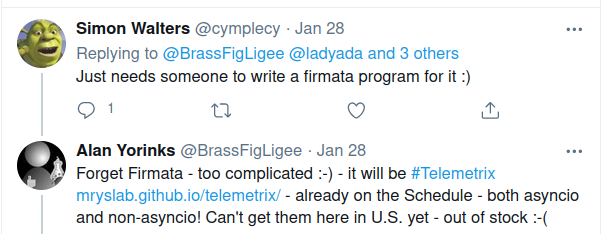I recently tweeted about my Raspberry Pi Pico posting and received a reply from Simon Walters (aka @cymplecy). Simon is famously known for S3GPIO, amongst other efforts in supporting physical computing education in the U.K.
Knowing that I have been mucking around Firmata support for Python over the past several years, Simon suggested adding similar support for the Pico. I lamented about not being able to obtain a Pico yet here in the U.S. In a private email, Simon offered to send me one, and I accepted. I can’t thank Simon enough.

As I anxiously await the Pico’s arrival, I have been busy reading the Raspberry Pi Pico documentation.
Using the documentation as a guide, I have successfully set up development environments for coding the Pico, both on a Raspberry Pi4 and my Ubuntu 20.10 box.
As mentioned in the Tweet, my intention is to provide a Telemetrix server for the Pico, and a Telemetrix Python client capable of running on Linux, Windows, and macOS. Essentially, Telemetrix allows you to send commands from your PC to the MCU to perform normal operations such as GPIO and i2c control from a fixed application running on the MCU. In addition, it automatically monitors and reports any changes to input data.
Since the Pico provides both C language and Micropython SDKs, the first problem for me to solve is which SDK to use. From a pleasurable programming point of view, Python would be my first choice. Having done similar projects that required similar decisions to be made, my experience has been that MicroPython’s efficiency for sending data across a serial link is rather sluggish. However, the RP2040, the Pico’s processor, is not a “normal” processor. Without getting into the details, the RP2040 has the capability of providing optimized support for I/O communication. The first thing that I will do is write a quick and dirty “benchmark” in both C and MicroPython to determine which to use. I will publish both the code and findings so that you may see how I chose the “winning” SDK. Let’s all pull for MicroPython!
That’s it for now. Stay tuned for my Pico adventures.
And once again, thanks, Simon. Not only for the offer of the board but for the distraction from dealing with Bluetooth ;-).

